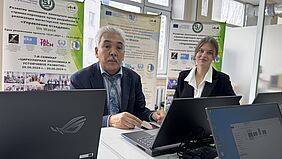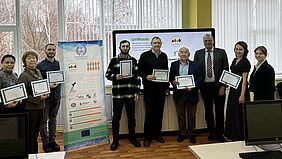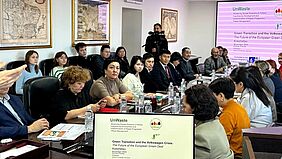Prof. Dr Gunnar Prause and project team member Svetlana Saidensal visited all Kazakh partner universities within the Erasmus+ project ‘UnWaste’ - Advancing Circular Economy in Partner Countries by Development and Implementation of Master Programme ‘Waste Management’ from 31 October to 6 November. During the trip, they visited the S. Seifullin Kazakh Agro Technical Research University (Astana), the Akhmet Baitursynuly Kostanay Regional University (Kostanai) and the Kokshetau University named after Sh. Ualikhanov (Kokshetau) to find out about the current status of the project. The meetings during the final phase of the project served to monitor the achievement of the project objectives, to check the equipment and teaching materials supplied and to assess the progress of the project.
Prof Dr Gunnar Prause and Svetlana Saidensal also met with initiative groups and the university management of the various institutions to discuss the results to date, important issues relating to project implementation and plans for future collaboration. Prof Dr Prause also gave presentations on the topics of ‘Green Transformation’ and ‘Circular Economy’ for students and staff from the various universities. The visit was an important step in the final phase of the Erasmus+ project ‘UnWaste’. It enabled the project to be evaluated and strengthened the partnerships with the Kazakh universities.
The overall aim of ‘Unwaste’ is to influence the current situation by developing engineering-based waste management curricula at Master's level and to raise awareness of the circular economy by developing new curricula in higher education institutions. This project would enhance practice-orientated learning to ensure the parallel development of soft skills (teamwork, communication, management, decision making) and hard skills (waste management) and provide future employers with evidence of problem solving. Main target group: Engineering students. Indirect beneficiaries of the project are: Industry partners, non-profit organisations and policy makers.



